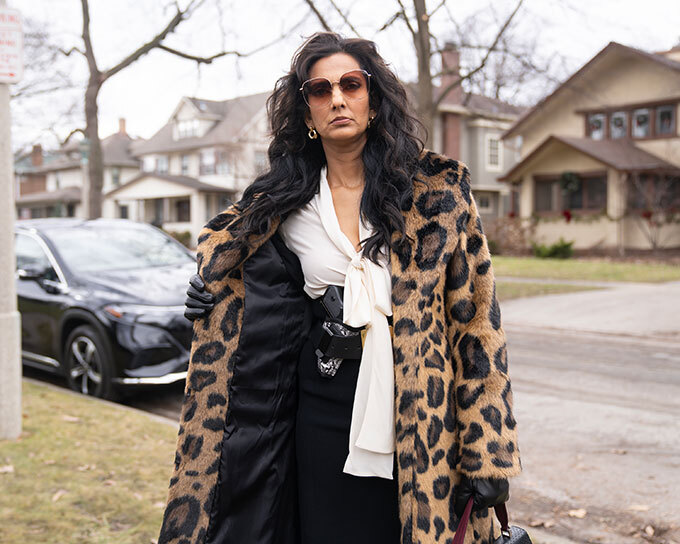
June 17, 2025
Beauty queenpin: ‘Deli Boys’ makeup head Nesrin Ismail on cosmetics as masks and mirrors
Glamour enlivens heritage and history in Hulu’s genre-bending series about a Pakistani family running an international drug ring from Philly corner stores.
Deli Boys defies classification. The series, which premiered on Hulu in March, is a 30-minute comedy that’s also a mob show that’s also a moving immigrant family story told through the screwball antics of quirky characters and campy blood spatters.
Created by Abdullah Saeed, Deli Boys tells the story of wealthy Pakistani-American brothers Raj Dar (Saagar Shaikh) and Mir Dar (Asif Ali), who are asked to take over their father’s business, DarCo, after his sudden death. What Raj and Mir don’t know is that their Baba’s Philadelphia convenience store empire is actually a front for an international drug ring, of which their beloved father was the kingpin.
For the rest of the 10-episode first season, rigid business school grad Mir and dreamy party boy Raj must work through the shock of their father’s secret and their own ineptitude to keep DarCo afloat. They are guided by Lucky Auntie (Poorna Jagannathan), Baba’s confidant who is a gangster in her own right.
Deli Boys tackles it all: South Asian diasporan dynamics, American capitalism, familial betrayal, Philadelphia’s criminal underworld, and its delusionally dedicated Eagles fans, all without missing a comedic beat. And it’s a visual feast. Gore is cleverly deployed, and Lucky Auntie’s nails always match her eye shadow.
It only makes sense that the head of the series’ makeup department would be just as versatile. Since immigrating to the U.S. from Egypt, Nesrin Ismail has worked on shows ranging from horrors like The Walking Dead and Lovecraft Country to comedies like Southside and Somebody Somewhere. On season one of Deli Boys, she oversaw both makeup design and special effects, shooting scenes out of order and doing up to five different looks in one day.
Ismail joins Design Observer’s Alexis Haut to discuss how she delivered the distinct visual style of Deli Boys, how working with women producers changed her on-set experience, and why Lucky Auntie’s look is so much more than makeup.
This interview has been edited and condensed for length and clarity.
Alexis Haut: You’re from Egypt, and you came to the U.S. to work in film. What influenced your interest in Hollywood films and makeup specifically?
Nesrin Ismail: When I was growing up, there was no internet. Reruns of old Hollywood movies, that’s really what I grew up on. It’s the only thing that made me bond with my father. He loved American movies, too — Hollywood movies from the 50s, 60s, some 70s, and the 40s. The old Singing in the Rain, Spartacus with Kirk Douglas — I was just mesmerized by how visually compelling these films are. I didn’t know what making a movie entailed; all I knew was that I wanted to be behind the scenes on a film.
Slowly, as I got older, I got more interested in makeup as just physically transforming yourself. That concept was interesting to me. And then from there, I graduated from university back home. A year into working jobs outside of film, I figured out pretty quickly that if I don’t make a career shift and follow what I want to do, I’ll get complacent. I’ll get too old to do anything. So I was lucky enough to have the money to go to America because that’s also a big deal — not everybody’s able to just go somewhere completely different. So I chose a makeup school and special effects school in LA.
AH: You’ve worked on many different genres from horror like The Walking Dead to comedies like Southside. When you’re working on something like Lovecraft Country or The Walking Dead, do you approach that differently than a more realistic show like Somebody Somewhere? And do you have a preference of what sort of genre you like to work in?
NI: I like a job where I can actually show my skill and a genre where there’s a visual punch to it. But work is work, at the end of the day. Each project comes with specific challenges. In Somebody Somewhere, for instance, although it looks so natural, one actor would be so much lighter skinned than the other actor. So we needed to lessen the stark difference between the two.
AH: Let’s talk Deli Boys. Several of the executive producers were women, and I know a number of the episode directors were women, as well. Did that make a difference in your experience on the show?
NI: Hands down, yes. There is an understanding. I hate saying this, but people always give more time to effects. They think it’s way more complicated than makeup. That’s not true. It is just different. A lot of people are willing to compromise on the visual aspect, if it’s beauty makeup. Understandable because in movie making, time is everything. Time is money. But you have to have a fair compromise between the effects and the practical. And I think women, in my experience, especially Jenni (Konner), Nora (Silver) and Michelle (Nader), they had an appreciation for the visual aspect of it.
AH: If we take a character like Lucky Auntie, Poorna Jagannathan’s character, for example, I thought this was such a cool role for her because she’s a gangster, but she’s glamorous; she’s maternal but never matronly. I feel like the makeup is really like the linchpin of her character. It’s always done and subtly coordinated with her outfits. What were the inspirations for this character? Did you collaborate with Poorna for her look?
NI: The only word I got for Lucky Auntie was “glamorous.” That’s all I got. And I’m like, “Okay, so, she’s Pakistani. For her age range, what does glamorous mean?” I pulled up Poorna’s skin coloring, and did a mood board of the colors that I thought would work really well on her and pulled some inspirations. They were all 1980s Bollywood glam. And that’s what we presented to the studio.
With the creative, now it’s a whole different world. It’s not like golden days. Even in a smaller show, what you do is that you get your visuals and then you have to run it by the studio. Everybody has to agree; you can’t just go and do your own thing. So, we did the presentation and the studio loved it. And then from there, you meet the actor.
When we did the first test with Poorna, she was very happy. And after that, we shot the pilot. I keep telling people, the pilot was shot one year before the actual episodes because the strike happened. And in the pilot, you’ll find that her fashion was a little bit different. It was a bit more 80s than if you look at the second episode. At first, I was like, “okay, this is great.” And then when I went back a year later, I was like, “I think we should soften it. It needs to be contemporary but rooted in history, not all-out 80s. What do you think, Poorna?” She was like, “Yeah, I agree.” Everybody has to be on the same page. Because if an actor is not happy with their makeup, it’s not going to pull the best out of them.
AH: And then on the other end, there’s Raj’s girlfriend / shaman, Prairie (Alfie Fuller), whose makeup is very contemporary.
NI: With Prairie, it was the opposite! Look at the pilot — still colorful. But it was not as punchy. The more that you read the second episode, it’s like, this girl is kind of a badass. We need makeup to match that. So let’s do the lines, let’s do the dots, let her be That Girl. The characters are so compelling and interesting and funny and weird, and I wanted to put that into it. It doesn’t have to be a stark difference, but everything evolves.
AH: What’s interesting about both of those characters, Lucky and Prairie, is that we don’t really see them at home getting ready; they’re always in full makeup. Why is that?
NI: I go back to the words written. Lucky was a poor kid. If you go through the episodes, you’ll find that she was sold to somebody as a servant; that’s how she got to America. Now she’s a business woman who has her own money, and she has authority. You gotta put a mask on for the world for that. To be able to come out of your door, fight every day to get a piece of your dream, you put on a mask. The people who do not care about putting on a mask, these are people who are privileged in a way that you just can come out of your door just being you. That’s not what’s happening for those characters. Same with Prairie’s character. There’s an episode where she singlehandedly fights all these men. She’s not a really doe-eyed hippie-dippie. No, all this is a mask. She had to fight all her life to be what she wanted to present the world to. You put on your war paint to be able to go through life. Men don’t do that. They don’t have to, but women do.
Deli Boys is now streaming on Hulu.
Observed
View all
Observed
By Alexis Haut
Related Posts
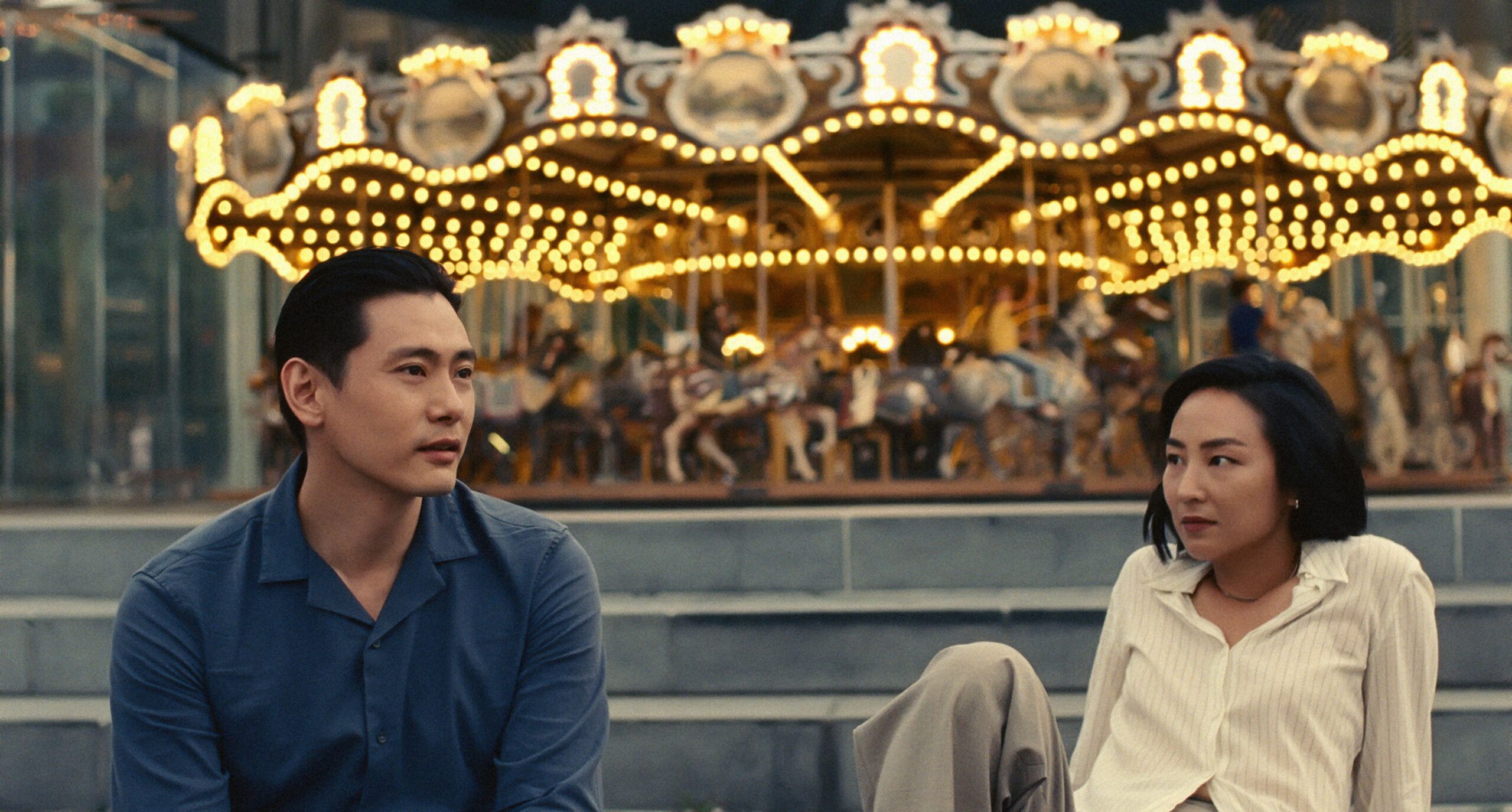
Arts + Culture
Alexis Haut|Interviews
How production designer Grace Yun turned domestic spaces into horror in ‘Hereditary’ and heartache in ‘Past Lives’

Design Juice
Rachel Paese|Interviews
A quieter place: Sound designer Eddie Gandelman on composing a future that allows us to hear ourselves think
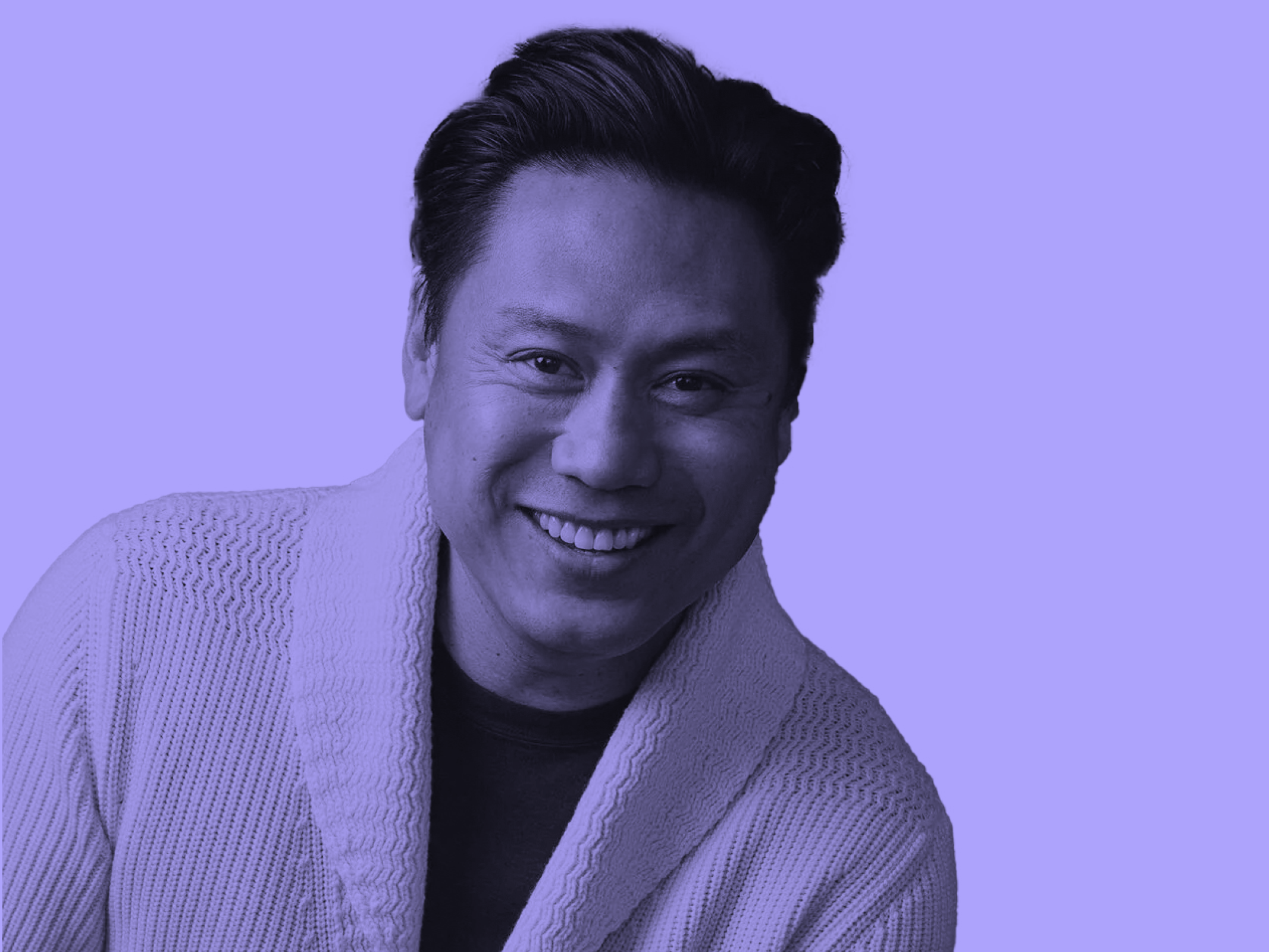
Design of Business | Business of Design
Ellen McGirt|Audio
Making Space: Jon M. Chu on Designing Your Own Path
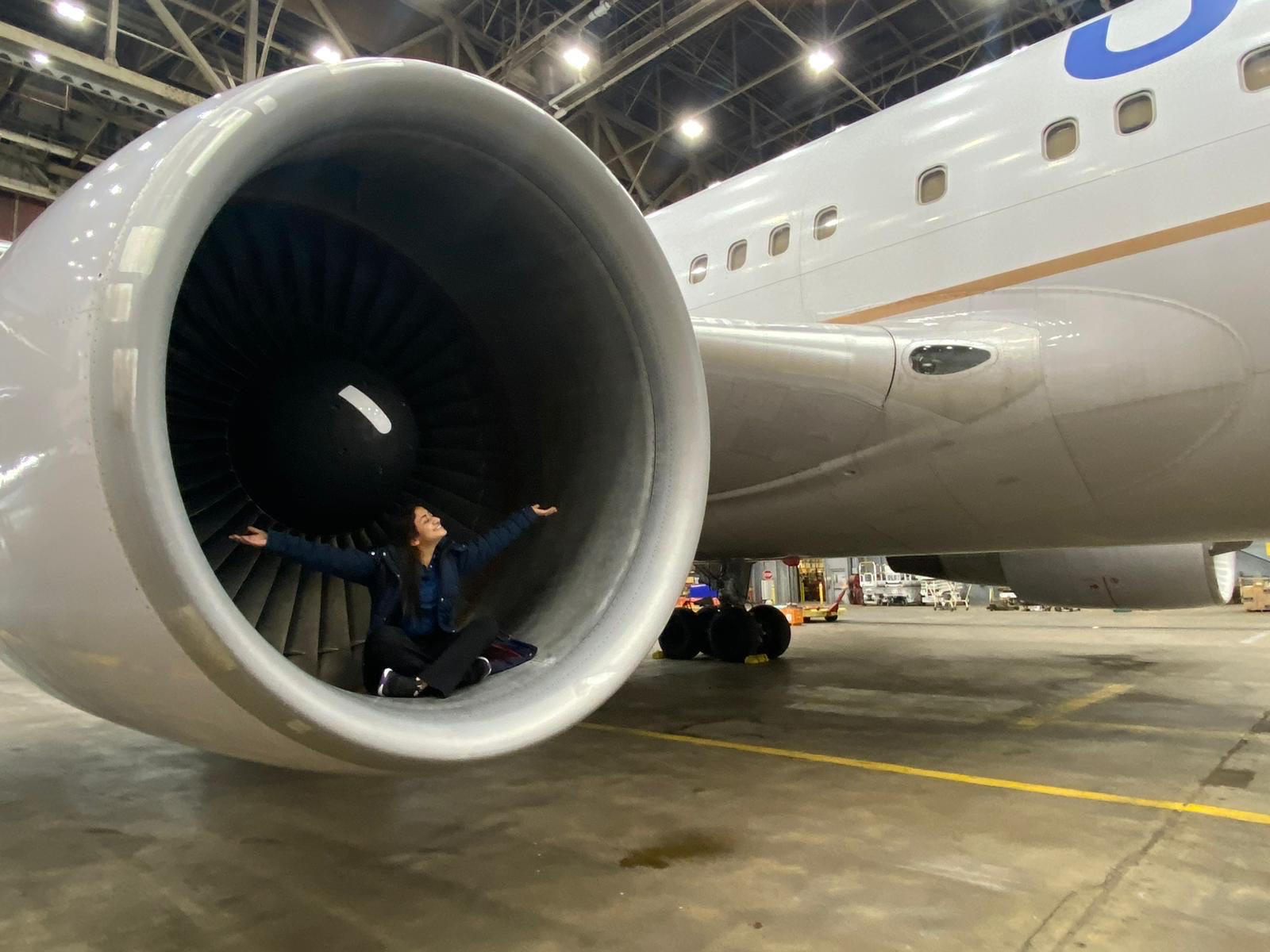
Design Juice
Delaney Rebernik|Interviews
Runway modeler: Airport architect Sameedha Mahajan on sending ever-more people skyward
Related Posts

Arts + Culture
Alexis Haut|Interviews
How production designer Grace Yun turned domestic spaces into horror in ‘Hereditary’ and heartache in ‘Past Lives’

Design Juice
Rachel Paese|Interviews
A quieter place: Sound designer Eddie Gandelman on composing a future that allows us to hear ourselves think

Design of Business | Business of Design
Ellen McGirt|Audio
Making Space: Jon M. Chu on Designing Your Own Path

Design Juice
Delaney Rebernik|Interviews

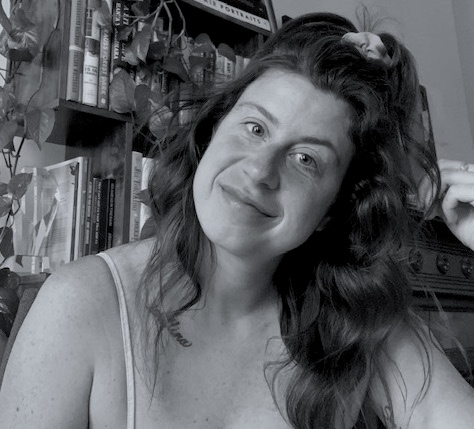 Alexis Haut is an audio producer, writer and educator based in Brooklyn. She spent seven years teaching, leading teachers and coaching basketball in middle schools in Brooklyn and Newark before independently producing her first podcast series in 2018. Her audio work includes the
Alexis Haut is an audio producer, writer and educator based in Brooklyn. She spent seven years teaching, leading teachers and coaching basketball in middle schools in Brooklyn and Newark before independently producing her first podcast series in 2018. Her audio work includes the